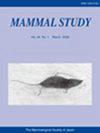Human–Macaque Conflicts in Shrinking Communities: Recent Achievements and Challenges in Problem Solving in Modern Japan
IF 0.8
4区 生物学
Q3 ZOOLOGY
引用次数: 16
Abstract
Abstract. The populations of the Japanese macaque (Macaca fuscata), which were vulnerable until the early 20th century, have recently recovered. However, this recovery process has rarely been hailed as a conservation success, because it has triggered serious conflicts between people and the macaques. The key exacerbating causes of the conflicts have been the drastic changes in the interrelations between the people, forests, and macaques, as well as the unprecedented social changes in modern Japan (i.e., nationwide depopulation). The aim of this review was to illustrate the bigger picture of these conflicts, by untangling the key root causes, and presenting the outcomes of previous macaque management efforts, which have rarely been presented to the global scientific community. Although recently acquired knowledge regarding macaque management has the potential to support the development of future solutions for the human-macaque conflicts, inadequate responses to the key causes of the physical and psychological hollowing-out of communities across Japan, should be understood as a limiting factor for conflict resolution. This review demonstrates the significance of seeking a resolution for this problem under a wider framework, in order to restructure community designs to be appropriate for the new era of shrinking communities.缩小社区中的人与猕猴冲突:近代日本解决问题的最新成就和挑战
摘要日本猕猴(Macaca fuscata)的种群在20世纪初之前一直很脆弱,但最近已经恢复。然而,这一恢复过程很少被誉为保护成功,因为它引发了人与猕猴之间的严重冲突。加剧冲突的主要原因是人类、森林和猕猴之间相互关系的剧烈变化,以及现代日本前所未有的社会变化(即全国人口减少)。这篇综述的目的是通过解开关键的根本原因,并介绍以前猕猴管理工作的成果,来说明这些冲突的全貌,而这些成果很少向全球科学界展示。尽管最近获得的关于猕猴管理的知识有可能支持人类与猕猴冲突的未来解决方案的制定,但应对日本各地社区身心空洞化的关键原因不力,应被视为解决冲突的限制因素。这篇综述表明了在更广泛的框架下寻求解决这一问题的重要性,以便重组社区设计,使其适合社区萎缩的新时代。
本文章由计算机程序翻译,如有差异,请以英文原文为准。
求助全文
约1分钟内获得全文
求助全文
来源期刊

Mammal Study
ZOOLOGY-
CiteScore
1.70
自引率
20.00%
发文量
23
审稿时长
>12 weeks
期刊介绍:
Mammal Study is the official journal of the Mammal Society of Japan. It publishes original articles, short communications, and reviews on all aspects of mammalogy quarterly, written in English.
 求助内容:
求助内容: 应助结果提醒方式:
应助结果提醒方式:


